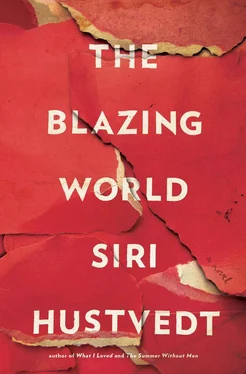IV. Paul Virilio (1932–), French cultural theorist, critic, and urbanist, has written extensively on technology. He argues that modern life is gripped by a never-ending acceleration and that speed and light have now displaced space and time. He has often been referred to as an apocalyptic thinker. Burden is obviously unsympathetic to his views. In Notebook X, which she apparently used as a dumping ground for random thoughts, Burden writes, “The man is nothing short of hysterical, in the theatrical sense. He has gained a following among boneheaded, equally hysterical young men by pushing half-truths to their logical but extreme ends. He is the theoretical incarnation of panic.”
V. From a letter dated November 20, 1665, by Baruch [Bendictus] Spinoza (1632–1667) to his friend Henry Oldenburg. Spinoza, The Letters , trans. Samuel Shirley (Indianapolis: Hackett, 1995), 192.
VI. Friedrich Nietzsche, The Gay Science , section 366.
VII. Philip A. Goldberg, “Are Women Prejudiced Against Women?” Transactions 5 (1968), 28–30. The study was replicated in 1983 by Michelle A. Paludi and William D. Bauer, using male as well as female subjects. “What’s in an Author’s Name?” Sex Roles 9, no. 3, 387–90. For later studies, see Virginia Valian, Why So Slow? The Advancement of Women (Cambridge, Mass.: MIT Press, 1998).
VIII. German philosopher, born in 1958, whose work integrates philosophy and neurobiology. Burden took extensive notes on a book Metzinger edited, The Neural Coordinates of Consciousness (Cambridge, Mass.: MIT Press, 1995).
VIIII. Humbert R. Manturana (1928–) and his student Francisco Varela (1946–2001), Chilean neurobiologists and philosophers who coauthored Autopoiesis and Cognition: The Realization of the Living (Dordrecht, Netherlands: D. Reidel, 1972), a book Burden mentions repeatedly in her writings. In Notebook P, she quotes from the book: “Living systems are units of interactions; they exist in an ambience. From a purely biological point of view they cannot be understood independently of that part of the ambience with which they interact; the niche, nor can the niche be defined independently of the living system that specifies it” (9). This embodied, embedded-in-the-environment position stands in opposition to computational theories of mind.
X. Judith Leyster (1609–1660), Dutch Baroque painter, a member of the Haarlem Guild of St. Luke, celebrated in her time but forgotten after her death. Because her work was similar to Frans Hals, many of her paintings were attributed to him. In 1893, the Louvre purchased what was believed to be a Hals but which turned out to be by Leyster. The discovery helped to restore Leyster’s artistic reputation.
Bruno Kleinfeld (written statement)

Did we settle down the way two fogies ought to settle down in their late-middle-to-old-age, their copious butts in a couple of La-Z-Boy chairs, their feet propped on ottomans, muttering, Did you take out the garbage, dear? Did you remember the milk? No, we did not. Old Man Time screwed us over. He ripped my lady away before we could become the doddering old farts we deserved to be together, sans teeth, squinting through our cataracts, reaching out for the old, soft flesh in the middle of the night. But Bruno, you wax Romantic. Harry was not a settler, and who knows if she ever would have settled in, settled down with her bear. She had been there, done that, in the time before Bruno. The husband — what a strange word — the husband kept coming back, like smoke in the room, stinking up the air between us. Felix Lord and his dough and his art and his sex life still burned like a forgotten cigarette in one of those goddamned crystal ashtrays Harry kept around from her former life on the uppity Upper East Side. God, I hated that effete ghoul who refused to rest, the way decent, normal dead people do. He haunted her. I kid you not. My verbs are not casual. I am a poet, failed, maybe, but a blathering bard, nevertheless, telling tales of those halcyon days of Harry not too long ago and not too far away. I am Bruno Kleinfeld declaiming for all to hear that Felix Lord came to her in dreams, half dead and half alive, a vampire with his fangs fastened in her neck, and my beloved would wake up sweaty and panicked, her eyes roaming the room for him, not because she wanted him back, but because she wanted to make sure he was dead and gone.
Maisie and Ethan, I beg your pardons, but Daddy-o took Mommy for granted. Did he fight for her? No, he did not. Where did it come from — Harry’s pseudonymous mania — except from him? How many women artists did Felix Lord show? Three? And over how many years? Harry watched, and Harry learned. She learned that her very own art-hustle mastermind wasn’t going to lift a finger for her work and that only art’s big boys get satisfaction. “He couldn’t help me, don’t you see?” Harry used to wail. “Sure he could” was my roared retort. After a while, the injustice of it all, the sick, sad misery of being ignored, cracked her heart in two and demented her with anger. I wanted her to fight on, but she decided to walk through the back door and send someone else around the front.
She was a strong woman, my Harry, but not an easy woman. The poem, the project of projects, the anthill that became a mountain, the thing I was eternally climbing and never getting over, my darling work of great verse, the one of Whitmanian proportions, my own American Commedia, that Harry had hugged close during the first year of our passion as my noble quest, became a bugbear once she understood that it wasn’t going anywhere. The poem became a nasty goblin that turned the flesh-and-blood darling of my life into a shrew, a carping, screeching, nagging witch who threw flaming daggers at me and the poem. “It’s so neurotic! You’ve rewritten it five hundred times. What is the matter with you? You’re so afraid. Do you think your cock will shrivel up if you’re not Dante, for Christ’s sake?”
No, it wasn’t easy loving Harry and the poem. I would creep off after a showdown about the interminable project and return to the hole across the street to lick my wounds on the scarred linoleum, and then crawl back, like the dog I was, to her big bed and her muscular arms that held me harder than any woman I’ve ever known. I couldn’t say it then, but the old girl was right about the poem. It had taken me into a dark wood all right, and it wasn’t ever going to get me to the Paradiso, but to give it up meant to give up me, myself, and I, as the ten-year-old Bruno Kleinfeld used to say as he admired his mug in the mirror after a game, reliving a big one he had blasted over the fence.
I couldn’t tell Harry, feminist warrior, that it was worse for a man, worse for a man to fail, to lose the strut in his walk as he feels the power sucked from his guts, the manly fire that had kept him going uphill. Millennia had piled up expectations, stone by stone, brick by brick, word by word, until the stones, bricks, and words weigh so much that the hopeful antihero can’t get out from under them — can’t see his way into a single line he might call his own, and he writhes under the tonnage, begging for mercy.
Despite her fears about the outside, Harry was free inside. She believed in her steam and fury, and she pushed her art out of her like wet, bloody newborns. When I die, they’ll see, she used to crow. The last joke will be mine. When I told her she reminded me of a de Kooning woman, one of those scary mammas with the leering mouths, she grinned with pleasure and rubbed her palms together. She hid The Heathcliff from me until she had finished it. The figure had a huge head thrust back, an open mouth, and a half-crushed birdcage between its gigantic hands. In the cage were bits of ripped lace, a book of Shelley’s poems, pieces of written-over paper, and a torn white stocking that drooped like a tongue between the bars. At first, the thing felt like a kick in the stomach, all force, but from up close, the person, if it was a person, had cuts and slices in its mottled bronze body and hanging breasts.
Читать дальше













